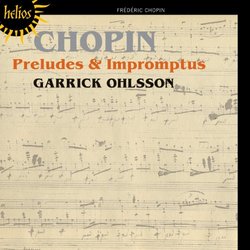| All Artists: Garrick Ohlsson Title: Chopin: Preludes & Impromptus Members Wishing: 0 Total Copies: 0 Label: Hyperion Original Release Date: 1/1/2010 Re-Release Date: 1/12/2010 Album Type: Import Genres: New Age, Classical Styles: Instrumental, Historical Periods, Classical (c.1770-1830) Number of Discs: 1 SwapaCD Credits: 1 UPC: 034571153834 |
Search - Garrick Ohlsson :: Chopin: Preludes & Impromptus
 | Garrick Ohlsson Chopin: Preludes & Impromptus Genres: New Age, Classical To celebrate the 200th anniversary of Chopin's birth, Hyperion has excerpted some of the finest performances from Garrick Ohlsson's complete Chopin project, originally recorded for the Arabesque label and reissued on Hyper... more » |
Larger Image |
CD DetailsSynopsis
Product Description To celebrate the 200th anniversary of Chopin's birth, Hyperion has excerpted some of the finest performances from Garrick Ohlsson's complete Chopin project, originally recorded for the Arabesque label and reissued on Hyperion as a 16-CD boxed set. These discs include some of the finest contemporary Chopin playing and include definitive performances of the complete etudes and marzurkas. Similar CDs
|
CD ReviewsGreat when you're Infected--Still Very Good when you're Not C. Pontus T. | SE/Asia | 02/07/2010 (4 out of 5 stars) "Time for my 100th review and for some redemption, as it were. Until a few years ago, I was entirely oblivious of Ohlsson's mature Chopin playing on Arabesque. Once having got bitten by the bug, I became deeply infected. Even if I am likely to remain infected for the rest of my life, I have to acknowledge that I cannot quite hear the same level of greatness I did in my original review of Ohlsson's 1989 Preludes on Arabesque. Indeed, he brings out the refined beauty in the slower Preludes like no other pianist, but employing the same approach to the most feverish numbers, in spite of the unity it creates, partly misses the point--namely that the 24 Preludes brought the structured greatness of Bach's keyboard writing right into the revolutionary Romantic movement.
The G major is smooth to a fault, the F-sharp minor is passionate but with a poker face, the G-sharp minor is articulate but not menacing, the B-flat minor is dexterous but not earth-shattering, and the E-flat major is supple but not sparkling. Still, again, Ohlsson has few peers when it comes to realising the luxurious textures of the E minor, the A major, the F-sharp major, the D-flat major, the A-flat major and the B-flat major Preludes. Additionally, his C-sharp minor, E-flat minor, F minor and D minor are as thrilling as those of Pogorelich, Katsaris and Argerich. As a 'bonus' compared with the original Arabesque incarnation, this Helios reissue also includes the magnificent Op 45 Prelude, which Ohlsson plays to perfection (like Pogoerlich, some 50% slower than Argerich). 'Oh, so Ohlsson is no longer the greatest living Chopin interpreter?' Indeed, he is, which he proves in spades in the four Impromptus. This quad often comes across as rather lightweight salon music--e.g. in the hands of Ashkenazy, Perahia, Rubinstein and Li. However, what Ohlsson does, like with the four early Rondos, is to elevate Chopin's inimitable writing to the sphere of consummate mastery where it belongs. Sample the somber middle F-minor section of the First, the gently rocking opening of the Second, and the whole of the Third and Fourth--both here turned into full-blown masterpieces: the Third Impromptu, Op 51, is something of a soul-mate of the great E-flat-major Nocturne, Op 55/2, with their intertwined bel-canto melismas--seemingly tailor-made for Ohlsson's fingers; the ubiquitous Fantaisie-Impromptu, here given in its original version, is restored back to its pre-'I'm always chasing rainbows' nobleness. To these ears, Pogorelich, in spite of all his nonchalance, remains unsurpassed in the 24 Preludes. Argerich is overall masterful as well but at times rushes her fences and over-pedals to distraction. Therefore, I would rather put a very recent discovery (ardently recommended by fellow reviewer, Melvyn M. Sobel) as the runner-up--Katsaris, whose account of the Preludes may be the most individual of all, indeed, idiosyncratic in the extreme. Next up is the Chamber Music (Helios CDH55384). REFERENCES: Pogorelich, Katsaris" |


